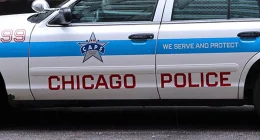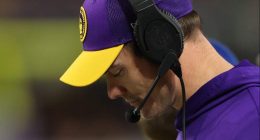[This story contains major spoilers from the season five finale of The Handmaid’s Tale, “Safe.”]
The Handmaid’s Tale often puts June Osborne in treacherous situations, and where the season five finale leaves its heroine is no exception. But, it’s helpful to remember that there is no Handmaid’s Tale without Elisabeth Moss’ starring character.
“The show exists because June survived,” Bruce Miller, creator and showrunner, tells The Hollywood Reporter in a chat about the final episode of the season, “Safe,” which he wrote and Moss directed. “The only reason the show is recorded history, in our fake world, is because she recorded it. So, she has to survive because it’s de facto what made this exist.”
That reminder comes in handy after the cliffhanger ending to season five, which put June aboard a train with other Gilead refugees in hopes of making it to Vancouver and, eventually, Hawaii. June spins a tale of adventure while cradling her youngest daughter, Nichole, in her arms moments after being separated from husband Luke (O-T Fagbenle), who turned himself into the police so June and Nichole could escape. Luke is then arrested for a murder he committed in self-defense and June is now tasked with carrying out their escape plan on her own — until she comes across Serena (Yvonne Strahovski) and her newborn on the very same train, another pair on the run.
Only Miller and his creative team, which includes executive producer Moss, know where June and Serena go next, especially with the sixth season being the final destination for the hit Hulu series. Speaking with THR, Miller reflects on another eerily timely season (he credits the Hulu marketing team for the finale dropping as votes were being counted in the 2022 elections), unpacks the open-ended final scene between June and Serena and teases what June will be fighting for when the show returns: “It’s a wonderful show in that it’s very easy to understand: They take something from June in the first scene that she wants back, that she’s not a complete person without. And that’s the whole show.”
Bradley Whitford spoke about the gun reform message behind the shooting that ended episode nine, and you have spoken about the anti-refugee storyline that’s been building. When June explains to Luke why they have to run in the finale, it felt like she was breaking the fourth wall with her warning (“This country is changing. … America wasn’t Gilead until it was, and then it was too fucking late”). How do you anticipate this season will resonate?
I’m never sure how the show is going to land. Partially it’s just that the political and news world moves so quickly. I didn’t know Queen Elizabeth was going to die a week before we were going to do a giant funeral on television; there’s no way to know that. So, I think it lands differently every year for every person. But in showing a world where people are being mean to refugees openly, I’ve heard lots of people say, “How can they do that?” And, we do that all the time. We do that so much that we don’t even see them; we scare them away. That’s what’s always interesting — not the people who see the parallel, it’s the people who don’t see the parallel at all. It’s no one’s job to pick apart a television show and see what’s there…
Well, it is my job.
Except for yours! I’m often worried that I’m too heavy-handed or obvious, only because we’re talking about the exact same problems now. I feel, unfortunately, that my show’s on the nose. So, often times I feel like it’s odd when people don’t see the connection.
Had you planned for the finale to drop on the eve of midterm elections, or is that how the schedule worked out?
It just worked out that way with the schedule. It’s funny, at the very beginning of the show, we were leading up to the presidential election between Donald Trump and Hillary Clinton. And we came out after that. But the initial discussion was, “Of course we have to come out before.” The only thing for us that ends up mattering is making the show. The amazing people in marketing make all those scheduling decisions, and I don’t think they make them until they have a show in their hands, and it takes us the same amount of time to make the show whether they tell us to rush or take our time. We have our heads too far buried in the job to really look up, but there are a lot of people out there who are looking up and saying, “Now would be a good time to put it on TV.”
Abortion rights were on the ballot this year, and The Handmaid’s Tale is a dystopian story about the erosion of bodily autonomy. Do you think this season has impacted voters, or do you feel like your audience already feels a certain way about these issues?
I think it’s both. I think every TV show, every piece of art that you see, bends you in a little way. So anybody who watches is going to, I hope, be affected in some way. So it’s just a question of, who is going to watch? And, who is going to be drawn to it? You’re certainly right in that it draws a lot of people who fear this situation and, in our country right now, those people tend to fall more on one side of the political spectrum. But I find when I talk to people — and people are so wonderfully nice and smart and thoughtful — that they see the show in very different ways and enjoy the show in very different ways, from all different points of view and almost none of them are political. Almost all of them are personal. I don’t think people think of it as a political show. They think of it as a show about June, which is exactly the way that I think about it.
You always say you follow June and the story when plotting seasons. At what point in your writing did you realize the next season would be the final one?
It was the very beginning of the season that I started to think very seriously about season six and, would it be the end? Once you start figuring out season five, you have to start thinking about season six. I do think about it in chunks. But, I think a lot of it came into focus because I had a lot of time during the pandemic to watch and rewatch and listen and read commentary. There are a lot of people who have a vested interest in the show going on, and I understand, but my job is to kind of ignore all of that and see what my decision would be if I didn’t hear all that stuff, and then add those things in.
When I talked to Lizzie [Moss] and Margaret [Atwood, The Handmaid’s Tale author] at the end of season four about the future, I started to think there’s a very, very nice little piece that comes at the end that I’ve been working towards. Season five is so much about June and her feelings about revenge, and how to exact revenge in a way that feels good and that feels like you’ve corrected some of the balance in the world. So much of that is about moving closer to June being someone who can do something again: Someone who isn’t just out of Gilead and in a ball but who has the ability to act. And then it’s a question next season of: What the hell is she going to do? You know you have to do something, because you know the world isn’t going to change unless you do something. What do you do?

Because this was such a big season for June and Serena, I asked Moss how the seventh episode (Serena’s labor in the barn) set them up for this final scene. But she said they didn’t know the ending at that time, only you did. At what point did you come upon this ending, that Serena and June would find each other on the train?
I always try to follow the story and the characters, and Serena’s story left her in a position where she could be a lot of different places. As you know, we do a ton of research. We were like, “Where would a person like that go?” When you talk to people who are refugees in countries and they escape, what kind of underground economy is in place? Certainly, there are a lot of Gilead sympathizers in Toronto.
But when did I think that was going to be the ending? Definitely when I read episode seven. Rachel Shukert wrote episode seven. It’s her first year on the show; she’s an excellent writer and a spectacularly fabulous human being, and a very good producer. And when I read that script and then watched the beauty of what Lizzie and Yvonne did with it — we have a very ecochamber-y show, where we listen to our actors, the performances and sometimes the alternate performances in the dailies and discuss what they brought to it and what they felt like they got out of it. You want to have a continuing conversation with them and let them dynamically change what’s going on in the show, and we did.
When we played out Serena’s story, it seemed so, logically, given June’s story, that they’d probably end up in the same place. They’re both trying to anonymously flee Toronto among a crowd of people. How many options do you have? I thought this is where Serena would end up before I thought this was where June would end up. It did feel like they were not running towards each other but running towards the same spot.
Moss spoke about their ambiguous facial expressions, and how she wanted June to give Serena the same smirk Serena gave June during Fred’s televised funeral at the beginning of the season. What do you hope the audience takes away from their reunion and where they are headed?
What I want the audience to do is to spend the next six or seven months asking that question. Because I spent all this time going, how do they feel about each other? And, how does June feel in that moment? Elisabeth directed the episode — she’s an EP on the show and even though I’m showrunner, we work very collaboratively and go back and forth — and you’re choosing those final expressions, the smirk and all those things, and they make all the difference in the world. Yvonne gives you nine slightly different ways to go, and what you pick makes a big difference. When you get into the editing room, and you’ve seen the whole episode and season up until that point, you really put a lot of weight onto that moment. But the nice thing is, that moment doesn’t have a lot of weight when they film it. It doesn’t have so much pressure, they just do it and then we get to pick and choose from what they do. Having Lizzie as a director is really helpful because she not only understands her thinking as an actor, which she does very, very well and from a distance, but she has worked with these actors for four years before she directed them. She really knows them and how to work with them effectively.
June and Serena are now headed to Vancouver with the hope they’ll get to Hawaii. Are you planning on starting the season with the train doors opening, or will you jump ahead?
I’m not going to tell you! Although I know where we’re going to start next year, we don’t tend to jump very much in time. And it’s simply because my brain doesn’t work that way. I’m like, “What happens next?” But also, it’s The Handmaid’s Tale, it’s June’s story. So if June is experiencing something, we want to touch on it and show what she’s experiencing. When she was shot, we were like, “We’ll come back when she’s well.” But, she didn’t get to come back when she was well. So, even if that experience is pain or boredom, we touch on it in a dramatic way to show you how June is experiencing it so that you’re with her in that real situation. If you jumped a bunch of time, you’d be in another tale. This is her tale. It covers this time. So, it’s pretty dense. It wasn’t unintentional that I always started to do one season right after the other, it’s that I can’t stand the idea of missing one tick of June’s face.

You’ve spoken about how you want the show to be unpredictable but how it always leads you to places that feel inevitable. You end with this eerie feeling that it’s all happening again; there’s a collective dread where everyone is scattered and angry and without resources. But The Handmaid’s Tale is a story about survival, and you’ve spoken about that being the optimism of the show, and we see how both Hannah (Jordana Blake) and Janine (Madeline Brewer) are poised to rebel. Why was this the theme you wanted to follow heading into the final season?
Well, I think you’ve asked the question. In a season where at the very end it feels like June is powerless — she can barely walk after the car accident, she has her baby all by herself and is in misery — she’s starting at the bottom. But what you’re saying is, look at all these people who are acting under her influence. You’ve put your finger exactly on where she’s come; she’s a leader now.
At the end of season one, when she got in a van and went away, you didn’t think about anybody else she left behind. They weren’t depending on her, and she certainly wasn’t inspiring them. Now, Janine has a moment in the finale where she acts very rationally but very powerfully because of June; she hears something about June and that impacts her from such a distance. So the idea that June, when she’s at the point where she seems to have the least resources and she’s at a low point for her, where she doesn’t even understand her relationships with her husband or with Serena, all the seeds she’s planted are blooming. All the seeds she’s planted are coming true.
There’s Esther (Mckenna Grace) out there, who is dangerous as hell; there’s Janine; there’s all the doubts that she planted in Aunt Lydia (Ann Dowd). When Serena asks June in episode nine, “Did you really wish us ill, did you wish revenge on us?” June says, “Look at Fred and look at where you are now.” And it’s hard when you punch someone as hard as you can to knock them down as hard you can, and then you end up with them, which is what happens with June and Serena, which is difficult. But the cool thing is that, if you look at the end of the season, June’s movement is hugely successful and she’s got nothing. She doesn’t even have a pot to piss in. She doesn’t have money. Serena Joy doesn’t even have a diaper.
But, you’re looking at a world these two women made and, look how powerful they are. When they’re on top, they’re really, really making a difference. And when they’re on the bottom, they’re still making a difference. They’re taking care of their kids and getting them out of danger. If you look at June as a cowboy, she isn’t doing very well. If you look at June as a farmer, she’s doing spectacularly well. Look at those fields, they’re all overflowing with rebels and smart people and Hannah writing her name — who knows who else she taught to write her name at that school? She’s June Appleseed.
Interview edited for length and clarity.
The fifth season of The Handmaid’s Tale is now streaming on Hulu.
Source: Hollywood








